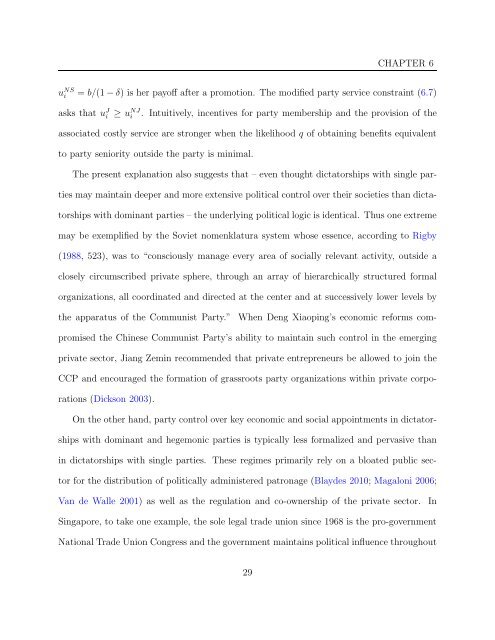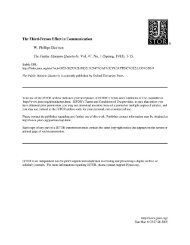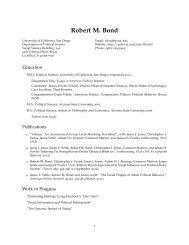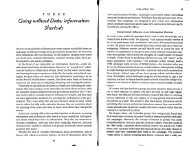Chapter 6 Why Authoritarian Parties? The Regime Party as an ...
Chapter 6 Why Authoritarian Parties? The Regime Party as an ...
Chapter 6 Why Authoritarian Parties? The Regime Party as an ...
You also want an ePaper? Increase the reach of your titles
YUMPU automatically turns print PDFs into web optimized ePapers that Google loves.
u NS<br />
i<br />
CHAPTER 6<br />
= b/(1−δ) is her payoff after a promotion. <strong>The</strong> modified party service constraint (6.7)<br />
<strong>as</strong>ks that u J i ≥ u NJ<br />
i . Intuitively, incentives for party membership <strong>an</strong>d the provision of the<br />
<strong>as</strong>sociated costly service are stronger when the likelihood q of obtaining benefits equivalent<br />
to party seniority outside the party is minimal.<br />
<strong>The</strong> present expl<strong>an</strong>ation also suggests that – even thought dictatorships with single par-<br />
ties may maintain deeper <strong>an</strong>d more extensive political control over their societies th<strong>an</strong> dicta-<br />
torships with domin<strong>an</strong>t parties – the underlying political logic is identical. Thus one extreme<br />
may be exemplified by the Soviet nomenklatura system whose essence, according to Rigby<br />
(1988, 523), w<strong>as</strong> to “consciously m<strong>an</strong>age every area of socially relev<strong>an</strong>t activity, outside a<br />
closely circumscribed private sphere, through <strong>an</strong> array of hierarchically structured formal<br />
org<strong>an</strong>izations, all coordinated <strong>an</strong>d directed at the center <strong>an</strong>d at successively lower levels by<br />
the apparatus of the Communist <strong>Party</strong>.” When Deng Xiaoping’s economic reforms com-<br />
promised the Chinese Communist <strong>Party</strong>’s ability to maintain such control in the emerging<br />
private sector, Ji<strong>an</strong>g Zemin recommended that private entrepreneurs be allowed to join the<br />
CCP <strong>an</strong>d encouraged the formation of gr<strong>as</strong>sroots party org<strong>an</strong>izations within private corpo-<br />
rations (Dickson 2003).<br />
On the other h<strong>an</strong>d, party control over key economic <strong>an</strong>d social appointments in dictator-<br />
ships with domin<strong>an</strong>t <strong>an</strong>d hegemonic parties is typically less formalized <strong>an</strong>d perv<strong>as</strong>ive th<strong>an</strong><br />
in dictatorships with single parties. <strong>The</strong>se regimes primarily rely on a bloated public sec-<br />
tor for the distribution of politically administered patronage (Blaydes 2010; Magaloni 2006;<br />
V<strong>an</strong> de Walle 2001) <strong>as</strong> well <strong>as</strong> the regulation <strong>an</strong>d co-ownership of the private sector. In<br />
Singapore, to take one example, the sole legal trade union since 1968 is the pro-government<br />
National Trade Union Congress <strong>an</strong>dthe government maintains political influence throughout<br />
29











